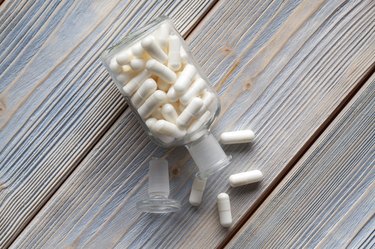
According to the Office of Dietary Supplements, folic acid is the synthetic form of folate, or B-9, one of the B-complex vitamins. The Linus Pauling Institute notes that folic acid exists naturally, but indicates that it is rare in foods and is commonly taken as a dietary supplement. Neither health organization lists folic acid as something that contributes to constipation or helps treat it. Take folic acid if your doctor prescribes it.
Folic Acid Overview
Video of the Day
In general, the B-complex vitamins facilitate physical and cognitive growth. Folic acid, in particular, is involved in the production of DNA and red blood cells. According to the March of Dimes, a nonprofit that promotes the health of babies, folic acid prevents brain and spinal cord defects in fetuses by its action in the mother's body.
Video of the Day
Folic Acid Sources
Greens, citrus fruits, whole grains and legumes contain folic acid. All of these foods are also sources of dietary fiber. They help keep your bowels moving regularly, preventing constipation. This seems to be the only link between the vitamin and the intestinal problem. Manufacturers also enrich bread, cereal, flour and rice with folic acid. Read the nutrition facts label. It will list folate as a food component if the product has been fortified. In addition, folic acid is available in supplement form, which you should take only if your doctor recommends it.
Folic Acid Intake
The Food and Nutrition Board of the Institute of Medicine recommends that pregnant women include 600 mcg of folic acid in their daily diet. They should maintain an intake of 500 mcg daily after giving birth if they are breast-feeding. Teenagers and adults, regardless of gender, need 400 mcg of the vitamin every day, starting at 14 years of age. Kids 9 to 13 require 300 mcg of B-9, while 200 mcg is the recommended intake for kids between 4 and 8. From ages 1 to 4, children need 150 mcg of folic acid. Between 7 months and their 1st birthday, babies should get 80 mcg of folic acid. Newborns need 65 mcg of the nutrient daily.
Potential Side Effects
Folic acid supplements do not usually cause side effects. But every individual can react to the nutrient in a different way, so there's the possibility of side effects. Breathing problems, rashes and itching are symptoms that need immediate medical evaluation to determine how safe folic acid is for you.